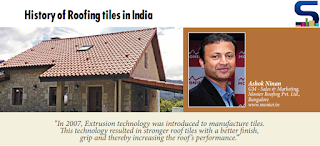History of Roofing tiles in India
Clay Roofing tiles became a prime material used for roofing in India from around 1865. Production of clay roofing tiles was started in Mangalore by Christian missionaries from Germany. Hence the tiles of this pattern were known as Mangalore pattern tiles or MP tiles in India. This tile pattern was originally invented in France and is known as Marseille tiles across the world. The tiles manufactured by missionaries have been found to be of immense use to the public and the Government, and the latter, as a mark of its appreciation, issued order to their Public Works Department to use tiles made by missionaries for all public buildings. Till the year 1960, tile industry was concentrated in a few areas like Mangalore in Karnataka and some cities in north Kerala like Calicut, and Trichur. Gradually, tile units started getting established in other parts of India. The most important centres were Morbi (Gujarat), Godavari, Samalkot, Hyderabad, Jagganpet (A.P), Kundapur, Mysore and Bangalore (Karnataka). By around 1995, there were more than 400 tiles factories in Kerala and around 75 tiles factories in Mangalore alone. Apart from Mangalore pattern tiles (which were available in many sizes), other patters and decorative tiles like Taylor tiles started getting very popular.
However the next decade and more, proved to be bad for the Indian clay tile industry. The restriction of mining of clay, non-availability of wood as a fuel, rising costs of labor in these parts of India, etc. led to closure of many clay manufacturing units. As a result the Indian customer started looking for better and durable roofing tiles for their houses.
In the year 2003, Pre-colored cement roof tiles were introduced in India by Lafarge Roofing (part of the Lafarge group), a multinational company from Europe and the largest producer of roof tiles in the world. These highly durable roof tiles were stronger than an average MP tile and absorbed very less water during rains preventing the growth of moss on their surface, a phenomenon usually seen on clay tiles after rains. Durable and long lasting pigments used for coloring the surface of these tiles meant that no painting was required at job sites, saving both money and time during installation of these tiles. In 2007, the manufacturing technology was upgraded from the most common press technology to Extrusion technology. This technology was introduced in India for the first time to make roof tiles. This technology resulted in stronger roof tiles with a better finish. In addition the detailing of the underside of these tiles resulted in an improvement of the grip these tiles had on a roof and improved the performance of the roof like making the roofs water tight, reflecting heat, skylight, and avoiding cement mortar for fixing of ridges.
Due to restructuring, the company was divested in 2008 and was renamed worldwide as Monier Roofing. Monier continued in the path of innovation and introduced Flat profile roof tiles in India in 2011, again a first in Indian roof tile market. This tile enhances the look of a house having a contemporary design and became an instant hit among the architectural community. Monier continues to bring new and interesting profiles for the deserving Indian customer and has recently launched a traditional design of high quality clay roof tiles called the Roman and flat clay roof tiles Plana from its manufacturing facilities in Europe. Though many options are now available for the Indian customer to cover the roof of their houses, Indian made or imported; expensive, affordable or cheap; a customer understands the efficiency brought by a good quality, strong and durable roof tiles. Hence the demand for roof tiles, clay tiles or cement would always remain in the Indian market.




Its a great pleasure reading your post.Its full of information I am looking for and I love to post a comment that "The content of your post is awesome" Great work Roof Tiles Jaipur
ReplyDelete